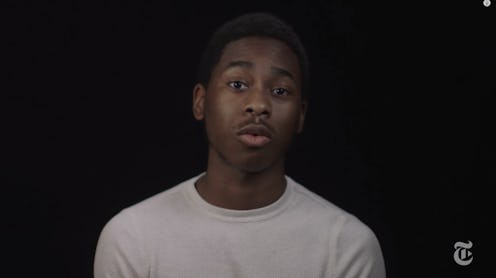Life
Young Men On What It's Like "Growing Up Black"

In the last year, race has frequently been a heated source of debate and protest, with shootings of unarmed black men and the recent death of Freddie Gray while in police custody bringing intense attention to the role that race plays in black Americans’ interactions with police. But although these events have brought necessary light to instances of misconduct within law enforcement, they shouldn’t blind us to the more subtle and more common forms of racism that shape the lives of black people everyday. The New York Times explores growing up as a black man in America in a short documentary, featuring interviews with young black men and boys ranging in age from 10 to 25. They explain with upsetting clarity how their race affects how others perceive them on a daily basis, and how their parents have tried to prepare them for living in a culture that consistently views black men as potentially dangerous.
In The New York Times, director and producers Joe Brewster and Perri Peltz explain that their work was motivated by what they perceived as a need to discuss how casual, everyday racism functions in communities across the country. They write,
As we debate the headlines about the deaths of young black men and police misconduct, from Baltimore to Ferguson to Staten Island, we fear our society is turning away from the painful conversations that need to be had at home, in our own communities, schools and families. Focusing our attention on the nation’s latest racial hot zone often devolves into the same old invectives about race and politics, and we lose sight of the bigger picture. Worse, it allows us to avoid the painful discussions we need to have with our young people about their concerns, and the role we each may play in them. We can be a part of the solution only if we dare to open up and have the conversation.
It is particularly heartbreaking to see young boys discussing the role that racism plays in their lives—to hear Maddox, at only 10 years old, assuring viewers, “I want people to know that I’m perfectly fine, and I’m not going to hurt anybody or do anything bad.” Even more upsetting is the knowledge that this is a reality lived by countless people of color, young and old, throughout the United States.
The interviewees recount how racism has shaped their experiences and perceptions of the world around them:
Miles, age 13
“I was walking home from school with this one white girl, and we’d just gotten off the bus, and…we were almost home. And there were these group of black kids that had just gotten out of school, and she was like, ‘Oh, let’s cross the street, there’s a group of black kids. I don’t want to run into them.’” – Miles, 13
Jumoke, age 17
“I’ve been stopped by the cops on my way between classes. We have two separate buildings, walking from one building to the other building. As my white students in the same class walk by me.” – Jumoke, 17
Malik, 17
“It’s kind of upsetting because we live in a world where my mom has to be afraid when I walk outside, from the people that are, like, meant to protect me.” – Malik, 17
Bisa, 17
“I walk tall, I keep my head up. Try to be very articulate, and polite. And so, of course, I was like, ‘OK, I’m going to be fine because I act a certain way,’ and of course that has absolutely nothing to do with it. The way people perceive you is not up to you." – Bisa, 17
Take a few minutes to watch the whole video:
Images: YouTube (5)